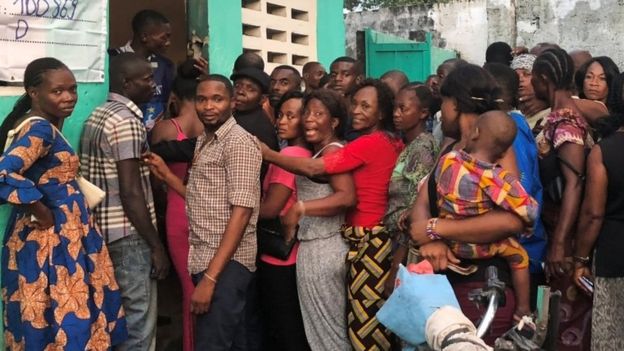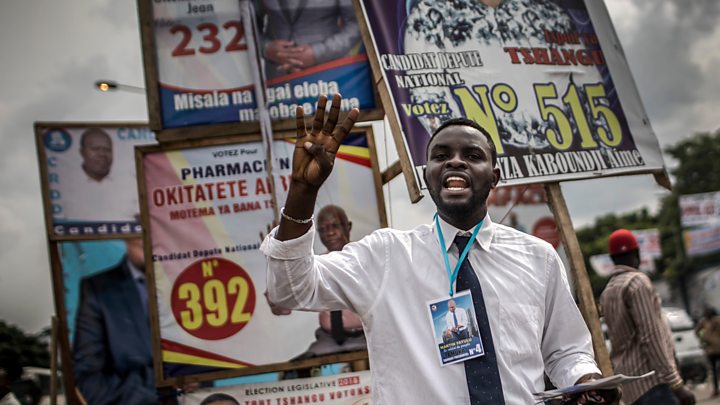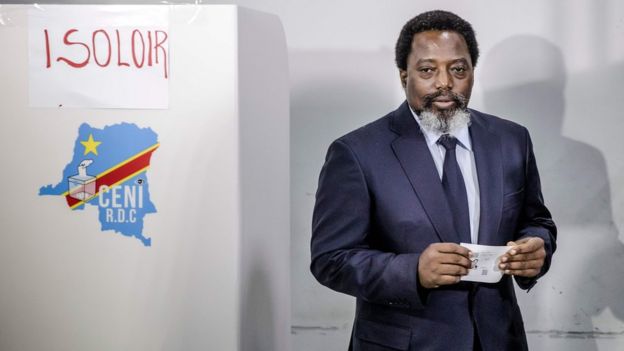The internet has been shut down in key cities in the Democratic Republic of Congo a day after the much-delayed presidential election.
Opposition candidate Martin Fayulu's campaign team accused the government of ordering the shut down to avoid broadcasting his "overwhelming victory" in Sunday's poll.
Telecoms minister Emery Okundji said he was unaware of the situation.
Observers have complained of widespread irregularities during the poll.
- Why do voters mistrust electronic voting?
- Five things to know about DRC
- In pictures: DR Congo chooses new president
- How African governments block social media
Counting is under way, but provisional results are not expected until 6 January.
President Joseph Kabila is stepping down after 17 years in office. He has promised DR Congo's first orderly transfer of power since it gained independence from Belgium in 1960.
Mr Kabila is backing his former interior minister Emmanuel Ramazani Shadary, who is the ruling party's candidate.
The two main opposition candidates are Mr Fayulu, a former oil executive, and Felix Tshisekedi, the son of the late veteran opposition leader Etienne Tshisekedi.
What do we know about the shutdown?
In the capital Kinshasa, the internet has not been working since the morning while it is also down in the key eastern cities of Goma and Lubumbashi, which are seen as opposition strongholds.
Internet provider Global said in text messages to customers that the government had ordered the shut down, AFP news agency reports.
 Image copyright: REUTERS
Image copyright: REUTERS
Image captionNearly 40 million people were eligible to vote in the election
A representative from the Vodacom mobile phone network also said that the government ordered them to shut the internet down, AFP reports.
How was the election conducted?
The Roman Catholic Church's observer team reported more than 100 cases of election monitors being denied access to polling stations.
It added that around 20% of polling stations opened late, and there were reports of polling stations being moved at the last minute.
Another local observer group, Symocel, said some of its 20,000 agents were subjected to intimidation.
Many of those who cast their votes could not do so in secret, it added.

In a BBC interview Mr Fayulu accused the military of "pushing" voters in some areas to cast their ballots for Mr Shadary.
Mr Tshisekedi accused Mr Kabila's government of creating a "mess" on election day in order to trigger legal challenges that would help the president remain in power.
President Kabila has insisted the election was free and fair.
Mr Shadary told the BBC that he had won the poll because "I'm the only one who's been campaigning in each of the 25 provinces of the country".
What's the background?
Mr Kabila took over from his assassinated father Laurent in 2001, but he was barred from running for another term under the constitution.
He was supposed to step down two years ago, but the election was postponed after the electoral commission said it needed more time to register voters.
 Image copyrightAFP
Image copyrightAFP
Image captionPresident Joseph Kabila is stepping down after 17 years in power
The decision triggered violent clashes, as the opposition accused Mr Kabila of trying to cling on to power.
The run-up to the poll was also hit by controversy over the exclusion of some 1.26 million out of an electorate of nearly 40 million from voting.
The electoral commission said voting could not take place in the eastern cities of Beni and Butembo because of a deadly Ebola outbreak in the region. Voting was also called off in the western city of Yumbi because of insecurity there.
Latest Stories
-
Bawku conflict: GLOSARGG presents eight-point roadmap to peace
8 minutes -
London Mayor Sadiq Khan to address innovation and education at University of Ghana today
24 minutes -
Ghana’s housing sector: 90% of houses built by individuals, land access must be improved – ISSER
29 minutes -
Fuel prices up: petrol going for GH₵12.88, diesel GH₵14.88 a litre
32 minutes -
Witchcraft accusation turns deadly: 4 arrested over killing of 70-year-old in Sangbana
41 minutes -
Teenager reports family to DOVVSU over limited meals, pocket money
46 minutes -
Bond market: Trading activity GH¢2.12bn, highest since 2023
49 minutes -
Importers and Exporters Association applauds appointment of women to GMA board
50 minutes -
BoG working on new framework to enable SMEs unlock short-term capital – Second Deputy BoG Governor
55 minutes -
PURC warns against unapproved meters as revenue loss hits NEDCo in Bono East
57 minutes -
Dr. James Orleans-Lindsay to deliver keynote address at Africa Rising Symposium at LSE
1 hour -
Cedi confidence and the cost of complacency: What the BoG Governor’s speech reveals
2 hours -
Ga Mantse pledges support for Onesta Ghana’s Palm Oil expansion drive
2 hours -
Today’s Front pages: Wednesday, July 16, 2025
3 hours -
2025 Ghana CEO Vision & Awards: Basil David Anthony nominated for CEO of the Year in Deco and Design
3 hours

